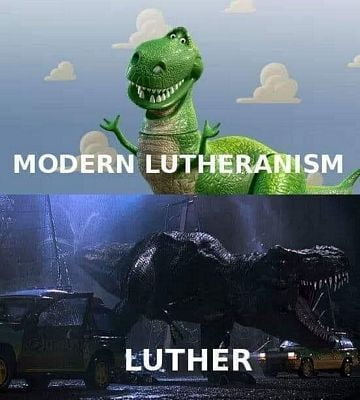Why I Like The "harsh" Or "difficult" Old Testament Narratives
I like the "harsh" or "difficult" Old Testament narratives. What I find refreshing is the raw honesty about people - God's people - and the struggles God and His people have with each other. There is a timelessness to it.
Too often, the difficult stories and events we reference get sanitized for our current sensibilities. The reality of those stories get lost. This meme is a favorite of mine, conveying how Luther's message has been "cleaned up" to make it more ..... palatable.

My observations of human life inform me that these old "stories" are as relevant today as they were 3000 years ago. A case in point is David and Bathsheba.
It happened, late one afternoon, when David rose from his couch and was walking about on the roof of the king’s house, that he saw from the roof a woman bathing; the woman was very beautiful. David sent someone to inquire about the woman. It was reported, “This is Bathsheba daughter of Eliam, the wife of Uriah the Hittite.” So David sent messengers to get her, and she came to him, and he lay with her. (Now she was purifying herself after her period.) Then she returned to her house. The woman conceived; and she sent and told David, “I am pregnant.”
What is shocking, right at the start of this story, is the protagonist is David. David, the little shepherd boy who God chose. David, the man God said was "after his own heart." David, the leader who we would least expect to commit this heinous sin.
Well, let's look at current times for people who took advantage of others by using their exalted positions. Three come to mind; Bill Cosby, Bill Clinton, and Harvey Weinstein.
David tries to hide Bathsheba's pregnancy; he attempts to make it appear as if the child is really Bathsheba's husband's, Uriah, which does not work. As so often happens, desperation escalates the efforts and leads to worse results. David sets up Uriah to be killed in a battle. David now has committed another sin.
True to life, lying makes the original mistake worse.
Soon, David is confronted by God for his sins. David admits his sins, God then "put away your sin." David does not have to die for his sin (which is what the law prescribes for what he did), but the child will die.
Harsh. Yet, there are consequences for our actions.
Items in this narrative I find worth pondering:
What is different between David and Clinton, Cosby, and Weinstein? I think it is David kept God in his heart, AND REPENTED when confronted.
If a servant of David's had said something like, "Bathsheba is not your wife. This could go badly." would David have reconsidered? Then again, much like today, the person that knew and could have / should have, said something was afraid of consequences to them self. Kind of a damning thought, really. Inaction is as bad as action in this case.
Is this story one that shows the consequence of hero worship? David was a lowly shepherd boy, and was raised to be king by the people.
Power corrupts. A good leader must have people around them who can, and will, challenge them when needed. How do we enforce this?
I have read other thoughts and opinions about this text. There is a lot here.
Do you have any thoughts to share about it?
Text References
2 Samuel 11:1 - 12:15 (NRSV)
David Commits Adultery with Bathsheba
Chapter 11
In the spring of the year, the time when kings go out to battle, David sent Joab with his officers and all Israel with him; they ravaged the Ammonites, and besieged Rabbah. But David remained at Jerusalem.
It happened, late one afternoon, when David rose from his couch and was walking about on the roof of the king’s house, that he saw from the roof a woman bathing; the woman was very beautiful. David sent someone to inquire about the woman. It was reported, “This is Bathsheba daughter of Eliam, the wife of Uriah the Hittite.” So David sent messengers to get her, and she came to him, and he lay with her. (Now she was purifying herself after her period.) Then she returned to her house. The woman conceived; and she sent and told David, “I am pregnant.”
So David sent word to Joab, “Send me Uriah the Hittite.” And Joab sent Uriah to David. When Uriah came to him, David asked how Joab and the people fared, and how the war was going. Then David said to Uriah, “Go down to your house, and wash your feet.” Uriah went out of the king’s house, and there followed him a present from the king. But Uriah slept at the entrance of the king’s house with all the servants of his lord, and did not go down to his house. When they told David, “Uriah did not go down to his house,” David said to Uriah, “You have just come from a journey. Why did you not go down to your house?” Uriah said to David, “The ark and Israel and Judah remain in booths; and my lord Joab and the servants of my lord are camping in the open field; shall I then go to my house, to eat and to drink, and to lie with my wife? As you live, and as your soul lives, I will not do such a thing.” Then David said to Uriah, “Remain here today also, and tomorrow I will send you back.” So Uriah remained in Jerusalem that day. On the next day, David invited him to eat and drink in his presence and made him drunk; and in the evening he went out to lie on his couch with the servants of his lord, but he did not go down to his house.
David Has Uriah Killed
In the morning David wrote a letter to Joab, and sent it by the hand of Uriah. In the letter he wrote, “Set Uriah in the forefront of the hardest fighting, and then draw back from him, so that he may be struck down and die.” As Joab was besieging the city, he assigned Uriah to the place where he knew there were valiant warriors. The men of the city came out and fought with Joab; and some of the servants of David among the people fell. Uriah the Hittite was killed as well. Then Joab sent and told David all the news about the fighting; and he instructed the messenger, “When you have finished telling the king all the news about the fighting, then, if the king’s anger rises, and if he says to you, ‘Why did you go so near the city to fight? Did you not know that they would shoot from the wall? Who killed Abimelech son of Jerubbaal? Did not a woman throw an upper millstone on him from the wall, so that he died at Thebez? Why did you go so near the wall?’ then you shall say, ‘Your servant Uriah the Hittite is dead too.’”
So the messenger went, and came and told David all that Joab had sent him to tell. The messenger said to David, “The men gained an advantage over us, and came out against us in the field; but we drove them back to the entrance of the gate. Then the archers shot at your servants from the wall; some of the king’s servants are dead; and your servant Uriah the Hittite is dead also.” David said to the messenger, “Thus you shall say to Joab, ‘Do not let this matter trouble you, for the sword devours now one and now another; press your attack on the city, and overthrow it.’ And encourage him.”
When the wife of Uriah heard that her husband was dead, she made lamentation for him. When the mourning was over, David sent and brought her to his house, and she became his wife, and bore him a son.
Nathan Condemns David
But the thing that David had done displeased the LORD,
and the LORD sent Nathan to David. He came to him, and said to him, “There were two men in a certain city, the one rich and the other poor. The rich man had very many flocks and herds; but the poor man had nothing but one little ewe lamb, which he had bought. He brought it up, and it grew up with him and with his children; it used to eat of his meager fare, and drink from his cup, and lie in his bosom, and it was like a daughter to him. Now there came a traveler to the rich man, and he was loath to take one of his own flock or herd to prepare for the wayfarer who had come to him, but he took the poor man’s lamb, and prepared that for the guest who had come to him.” Then David’s anger was greatly kindled against the man. He said to Nathan, “As the LORD lives, the man who has done this deserves to die; he shall restore the lamb fourfold, because he did this thing, and because he had no pity.”
Nathan said to David, “You are the man! Thus says the LORD, the God of Israel: I anointed you king over Israel, and I rescued you from the hand of Saul; I gave you your master’s house, and your master’s wives into your bosom, and gave you the house of Israel and of Judah; and if that had been too little, I would have added as much more. Why have you despised the word of the LORD, to do what is evil in his sight? You have struck down Uriah the Hittite with the sword, and have taken his wife to be your wife, and have killed him with the sword of the Ammonites. Now therefore the sword shall never depart from your house, for you have despised me, and have taken the wife of Uriah the Hittite to be your wife. Thus says the LORD: I will raise up trouble against you from within your own house; and I will take your wives before your eyes, and give them to your neighbor, and he shall lie with your wives in the sight of this very sun. For you did it secretly; but I will do this thing before all Israel, and before the sun.” David said to Nathan, “I have sinned against the LORD.” Nathan said to David, “Now the LORD has put away your sin; you shall not die. Nevertheless, because by this deed you have utterly scorned the LORD, the child that is born to you shall die.” Then Nathan went to his house.
1 Samuel 16:11-13 (NRSV)
Samuel said to Jesse, “Are all your sons here?” And he said, “There remains yet the youngest, but he is keeping the sheep.” And Samuel said to Jesse, “Send and bring him; for we will not sit down until he comes here.” He sent and brought him in. Now he /was ruddy, and had beautiful eyes, and was handsome. The LORD said, “Rise and anoint him; for this is the one.” Then Samuel took the horn of oil, and anointed him in the presence of his brothers; and the spirit of the LORD came mightily upon David from that day forward. Samuel then set out and went to Ramah.
1 Samuel 13:13-14 (NRSV)
Samuel said to Saul, “You have done foolishly; you have not kept the commandment of the LORD your God, which he commanded you. The LORD would have established your kingdom over Israel forever, but now your kingdom will not continue; the LORD has sought out a man after his own heart; and the LORD has appointed him to be ruler over his people, because you have not kept what the LORD commanded you.”
